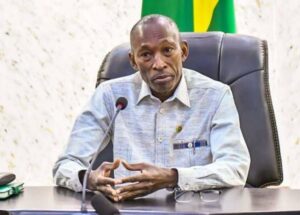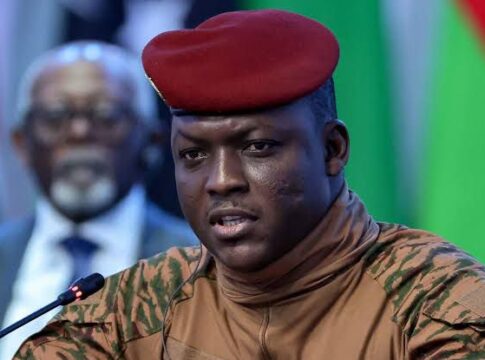Burkina Faso’s military leader, Captain Ibrahim Traoré, dismissed Prime Minister Apollinaire Joachim Kyelem de Tambela on Friday and dissolved the government, a presidential decree revealed. The announcement marks another dramatic shift in the West African nation’s volatile political landscape.
The decree stated that the prime minister’s “official functions are terminated,” with government members tasked with managing ongoing affairs until a new administration is formed. No reason was provided for the dismissal, deepening speculation about internal tensions within the junta.
Kyelem de Tambela had led three successive governments since his appointment in October 2022, shortly after Traoré overthrew former coup leader Paul-Henri Sandaogo Damiba. “This decision reflects the junta’s strategy to consolidate power amidst growing domestic challenges,” political analyst Amadou Sidibé told Reuters.
A Nation in Flux
Burkina Faso has been in turmoil since January 2022, when Damiba ousted elected president Roch Marc Christian Kaboré. Traoré, 36, then seized power from Damiba eight months later, accusing him of failing to address escalating jihadist violence. Damiba now lives in exile in neighboring Togo.

Under Traoré’s leadership, the junta has pursued policies aimed at restoring “national sovereignty,” distancing itself from Western powers and aligning more closely with Russia. This pivot has drawn criticism but also garnered support among citizens frustrated with years of French influence and limited progress against Islamist insurgents.
Alliances and Challenges
Burkina Faso’s strategic realignment includes joining Mali and Niger to form the Alliance of Sahel States (AES) in September 2023. The coalition, designed to enhance regional security, has severed ties with France and sought military support from Russia. Foreign Minister Karamoko Jean-Marie Traoré recently stated that cooperation with Moscow is “better suited” for the country’s needs.
READ MORE: Nigeria’s Tax Reform Bills Promise to Curb Elite Financial Mismanagement – Bishop Kukah
The alliance is part of a broader effort to combat jihadist violence that has claimed over 26,000 lives and displaced nearly two million people since 2015, according to data from monitoring group ACLED. Moscow has sent military instructors to support these efforts, although critics warn of the potential risks associated with Russia’s involvement in the region.
Public Reaction and Future Steps
The government’s dissolution comes as Burkina Faso battles mounting humanitarian and security crises. “We need strong, decisive leadership to tackle these challenges,” said Ouagadougou resident Fati Sangaré. “Changing the prime minister won’t solve everything, but we hope it brings some clarity.”
The junta is expected to announce a new government soon. Observers believe the move reflects Traoré’s attempt to maintain control while addressing public dissatisfaction and the ongoing conflict. As Burkina Faso’s political landscape continues to shift, its people are left grappling with an uncertain future.




